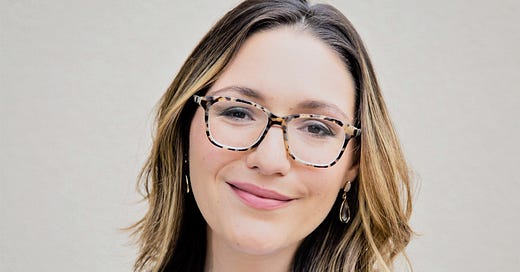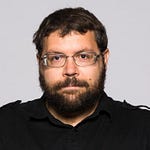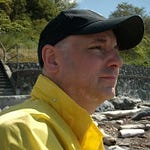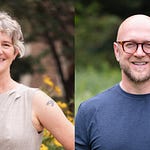
Episode 2 Transcript
Joshua Doležal
I’m Joshua Doležal, and this is Catchment, the podcast for The Recovering Academic Substack series. My guest today is Dr. Sarah Trocchio.
I met Sarah last year while researching an article on younger faculty for The Chronicle of Higher Education. She is owner and operator of The Square Peg Club, a coaching and strategy firm for – in her own words – “badass academics of all stripes.” If you have ever felt like your values are a poor fit for academe, Sarah is a kindred spirit.
Sarah Trocchio
I am just drawn to people that feel that sense of being a misfit and want at first to know that that's OK. Like it's OK if you've signed up to explore or hopefully try a lifetime appointment, and that doesn't work for you. It's absolutely OK, and part of what I have tried to integrate into the way that I think about my own career as well as my clients that I'm working with is just to normalize that even though something is called a tenure-track position and you are in it, you still have the right to have your full humanity impact how you think about, evaluate, reevaluate, and re-discern this notion of bidirectional fit, to what extent an organization and institution, a department, a role is serving you.
Joshua Doležal
Sarah is also Assistant Professor of Sociology and Criminology at Rider University in New Jersey. She thinks of herself as an activist-scholar, in that order, and her research explores the structures that allow inequity to persist in social institutions. As you’ll hear, Sarah draws much of her commitment to social justice from her grandparents, both Jewish refugees from Egypt, and from her father, an Italian-American from Pittsburgh.
This is the second episode of Catchment, the first available only to paying subscribers. You can upgrade your subscription at joshuadolezal dot substack dot com, slash subscribe, or just click on the button in the podcast transcript. Your support allows me to pay my podcast guests a modest stipend. It also gives you access to my full archive and subscriber-only content, like stories for The Chronicle and literary work that I’ll share throughout the year. If you can’t afford a paid subscription but want to stay engaged with this community, you can email me at dolezaljosh@gmail.com, and I’ll gift you access for a year. That’s Dole, as in the pineapple, Z as in zebra, A, L, Josh. At Gmail.com.
Now back to my conversation with Sarah Trocchio.
Joshua Doležal
You came from a family of educators. And your grandmother was one of them. Could you tell me about her?
Sarah Trocchio
Yeah, so my grandmother was super badass. My maternal side of the family, they are all refugees from Cairo, Egypt. They are Sephardic Jews, meaning they're Middle Easterners, and they are also Jewish. So, my grandmother was a stay at home mom, but an incredibly intelligent one in the 40s and early 50s when my grandfather worked on the Suez Canal. And then basically my very minimal understanding of global events at the time was that there was a lot of tension that came up in the context of my grandfather working on the Suez Canal, there was a lot of anti European sentiments in the Middle East at that time. And so things became very politically unstable for them, and my grandfather was actually kidnapped and imprisoned multiple times, taken away from his family. I'm always sort of unsure how much of that was connected to Judaism versus his employment at the Suez Canal. But basically he was an accountant there and after that event happened and he was re-released from his term of imprisonment, no shocker here, my mom’s side of the family decided to flee. And so they worked with a place called the Hebrew International Aid Society, HAIS. They were randomly placed first in Paris and then later in Colorado Springs, which was a very random location off course, for refugees from Egypt. And my grandfather ended up becoming an accountant in Colorado when they were resettled there, they had three kids as well, just like you do. My mom was nearly eleven when they came over on the boat from France to the US and then took a train in the middle of winter -- my mom had never seen snow -- to the middle of Colorado. And once they got there, my grandfather had a totally fine but not remarkable career as an accountant and my grandmother just flourished. She ended up going and getting her PhD in comparative literature. She was bilingual by virtue of this, or trilingual, actually, because they spoke Arabic, French and English by the time they were all done with their adventuring. And my grandmother just immediately became obsessed but in a very endearing way with Colorado College. Got her PhD and ended up becoming a professor there and spent decades as a beloved educator and teacher there. So she's the first.
Joshua Doležal
What a remarkable story, and I know that your parents were both high school educators. But you told me earlier that you never once thought of yourself as an academic growing up. You never had a thought of wanting to be professor like your grandmother. That was not something you were aspiring to. Why was that?
Sarah Trocchio
I think there was something that just felt a little too ephemeral about the Academy. I'm a little bit impatient. I like direct impact. I like feeling and seeing sort of the net impacts of what I do kind of immediately. And while I always loved to read and I always loved to think and I always loved to consider, and I'm sure that my familial history in that regard you know, was really deeply impactful in that way, I was always interested in isms, my dad, for his part, was the son of a widowed lunch counter worker, basically, at a really cheap diner in Pittsburgh. He grew up in McKees Rocks and in poverty, and he was a first gen college student. So a very interesting sort of mash up, and so I always deeply respected education. Education was how my parents met in a master’s program at Duquesne. It was what my grandmother did, and also there were pieces of it that felt a little too heady and not quite yet applied. So I remember for instance, my dad poring over the details of the Sacco and Vanzetti case. These were these two Italians that were potentially wrongfully convicted during some really serious anti-Italian sentiment. My dad was a very proud Italian. And I remember he would bring me books and books and books about it. And I loved to consume the books, but I always just wanted to be one of the advocates working with Sacco and Vanzetti rather than being the book writer. That's sort of the way that I can describe it. My sister, on the other hand, was immediately taken with sort of all that the academic world, the life of the mind, might offer, and as early as I remember, she wanted to be not just an educator, but a professor like her grandmother.
Joshua Doležal
So from your dad's side, too, there was this strong history of fighting for justice. Awareness of inequity. Awareness of ethnic discrimination in the courts. So you inherited that from both sides.
Sarah Trocchio
Yes, I think I absolutely did and I think my parents’ story itself, you know, was not without conflict. They had a lot of interfamilial conflict by virtue of marrying. You know my dad was the first person that sort of married outside of this really beloved but very small community in McKees Rocks. And not only did he go out and find somebody that was incredibly worldly, it was a woman that was by all accounts brown, and also had a very different ethnic and religious background than he did, and that did not always go over well. Inversely on my grandparents’ side, as progressive as they were, and as beloved as my grandmother was as this incredible Comp Lit professor, they also you know as refugees had really wanted their daughter to marry somebody that understood the struggle they had been through. And keep in mind this was in the late 50s, early 60s, that they came to the United States, and so by the time my mom was in college there were folks that were children of survivors of the Holocaust, for instance. And so it was all, I think, upsetting for my maternal grandparents that my mother chose to marry so outside of her family narrative as well. So that shaped me quite a bit, just sort of witnessing some of that classism that happened between my maternal grandparents’ side and my dad's family. And honestly, some of the racism and xenophobia. That sort of carried over some of what I understood the relations to be between my dad's side of the family and my mom.
Joshua Doležal
I know that you initially wanted to go to law school or felt that you should. I don't know if that was a family expectation that was passed on to you. Did that grow out of this immersion in stories of injustice and persecution? Were you thinking of being an attorney as one of those ways of making a difference?
Sarah Trocchio
Yeah, so when I tell that story about Sacco and Vanzetti and this really sort of like dilapidated row house that my dad lived in, he actually lived next door to the attorney that defended Sacco and Vanzetti and he was a very very old man at the time that my dad was a young child. But I always wanted to be the person talking to that attorney, right? And so yes, advocacy and thinking about direct impact and how I might be able to use my voice and skill set to create and catalyze change external to me and change beyond just sort of the dissemination of knowledge which I deeply respect and think it's really important always captivated me and carried me forward for decades and still does.
Joshua Doležal
So you took the LSAT? Or you were studying for the LSAT and it didn't go as planned. I think you said there was a bus ride that this happened on.














